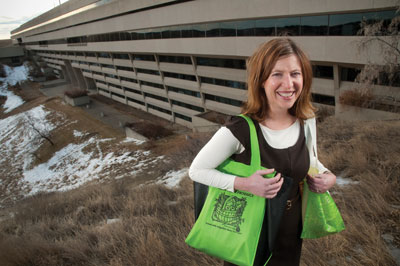
Building trust with consumers shouldn’t be hard for farmers – surveys
have found them to command the trust of more than 90 per cent of
Canadians.
Building trust with consumers shouldn’t be hard for farmers – surveys have found them to command the trust of more than 90 per cent of Canadians.
 |
|
| Dr. Debra Basil, with reusable produce grocery bags outside the University of Lethbridge. PHOTO COURTESY UNIVERSITY OF LETHBRIDGE Advertisement
|
But that doesn’t mean mistrust can’t build up, says Debra Basil, director of the Centre for Socially Responsible Marketing at the University of Lethbridge in Alberta. One of the common ways, especially with the current emphasis on lending a green and sustainable tinge to everything, is through the practice of “greenwashing” – painting something as sustainable that really isn’t.
Heuristics, or rules of thumb, are tools consumers use to simplify shopping. And green claims can serve as heuristics in the marketplace, signalling to consumers that a product is something – or isn’t.
“More and more companies are using green claims, and they’re using them because they do find them to be effective, because consumers do care and do respond when they’re used properly,” Basil told greenhouse growers at a recent conference.
“We tend to have customers who are fairly educated and they are interested in knowing as much about their food as possible,” says Libba Letton, a spokesperson with Whole Foods Market’s headquarters in Austin, Texas, which has stores in Toronto and Vancouver.
BRAND STANDARDS NEED CONSISTENT REINFORCEMENT
■ This is achieved through consistent reinforcement of its brand standard, from signage that makes its claims about its products clear, to scrutinizing products that ensure items measure up. Consumers, in turn, can take ownership by looking for third-party certification tags, such as the USDA Organic sticker.
These sorts of markings increased significantly after 2003, Basil said, and even more since 2006. Claims take the form of labels that highlight materials (recycled or organic content), a product life cycle that is environment-friendly (such as being recyclable zero-impact), some level of certification (third-party or otherwise, such as the USDA label), and unqualified assertions of environmental goodness.
“We’re seeing a tremendous growth in this approach, and being heuristic purchasers like we are, as consumers, we don’t always pay attention to what that eco-logo means or where it comes from,” Basil said, before cautioning: “it can definitely mislead consumers.”
Indeed, what sounds good may in fact damage an entire industry – especially when it’s intentional.
“This does a disservice to everyone,” Basil said. “It misleads the consumer, it makes consumers skeptical so that other companies who actually are using environmentally sound practices are penalized in that consumers are more leery of purchasing from them.”
THE SEVEN VARIATIONS OF GREENWASHING
■ Citing a 2009 report by TerraChoice Environmental Marketing Inc. of Ottawa, Basil outlined seven variations on greenwashing:
- Hiding a trade-off, or touting one aspect as green when another aspect of the same product is environmentally damaging.
- Providing no proof for the claims being made.
- Being vague, a good example being the triangular recycling logo that looks good but doesn’t in itself specify if the product can be recycled or if it contains recycled content (and if so, how much).
- Being irrelevant, such as touting the fact that produce doesn’t contain trans fats.
- Touting reduced harm, rather than eliminating the harmful ingredient altogether.
- Fibbing, which Basil notes “completely erodes consumer trust.”
- False labelling, or using labels to trick the consumer into believing something is true about a product that isn’t.
“Don’t violate the consumer trust because the consumer will rebel,” Basil said.
PARTNERSHIPS WITH CREDIBLE ORGANIZATIONS
■ The alternative to greenwashing, Basil said, is developing credibility through relationships and partnerships with credible organizations that will back you up.
“That simple association can help give you that credibility,” she said. “But it’s really important that if you do that, if you’re aligning with another organization, that there’s a logical fit between what you do and what they do.”
Such relationships may be through certification programs that give a third-party review of the farm’s product, or through partnerships with organizations that are doing good things. Show the consumer how supporting the company can have a positive impact, and consumers will typically respond favourably.
“That sense of self-efficacy is tremendously important. That will motivate the consumer,” she said. “The sense that they are making a difference is what really makes the difference in consumer purchasing.”
| Transparency is key for ‘green’ retailers Austin, Texas-based natural foods retailer Whole Foods Market is known for taking a leadership position when it comes to verifying claims about products. It typically has its own standards for products, refusing to list those that don’t measure up to the standards it tells consumers it has. “We’ve just tried to be as transparent as possible,” said Libba Letton, a spokesperson at Whole Foods Market’s headquarters in Austin, Texas. Holding a firm line is especially important in cases where government regulations or some other third-party certification doesn’t exist. Reinforcing the house standard to consumers follows in consequence. “If there’s not a government agency regulating what you can and can’t say… that’s something we do,” Letton said. |
Peter Mitham is a freelance writer and photographer in British Columbia.
Print this page